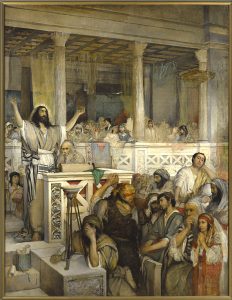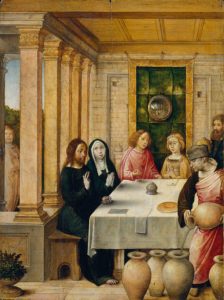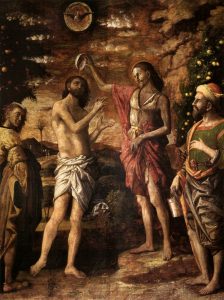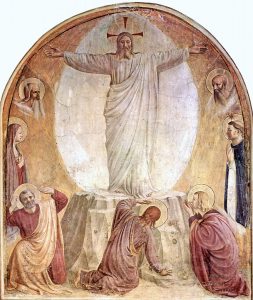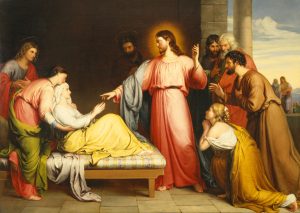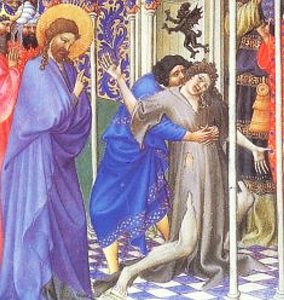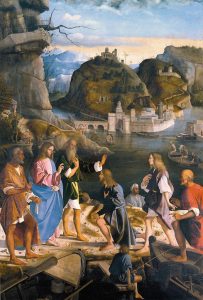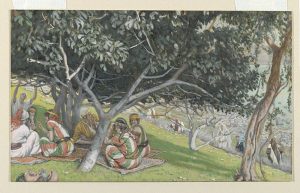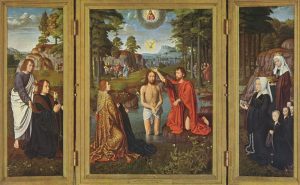Thoughts on Sunday’s Lessons for Feb. 2, 2020
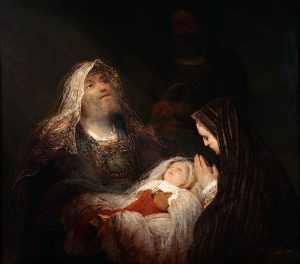
Simeon’s Song of Praise, Nunc Dimittis (c.1700-c.1710). Oil painting on canvas by Aert de Gelder (1645-1727). Royal Picture Gallery Mauritshuis, The Hague, Netherlands. (Click image to enlarge.)
First Reading: Malachi 3:1-4
The feast of the Presentation of Our Lord comes 40 days after Christmas. When it falls on a Sunday, as it does this year, it takes precedence over the usual liturgy for the season of Epiphany. Sunday’s Gospel reflects on the presentation of the baby Jesus and the ritual purification of his mother, Mary, in the Jerusalem temple. First, we hear the Prophet Malachi speak of purification, using the metaphor of a refiner who purifies gold and silver with heat and fire: poetic words that the composer Handel will later adopt for a beautiful aria in The Messiah. For Malachi, the refiner’s cleansing fire stands as a symbol of Israel’s duty to restore the Temple and its priesthood upon the people’s return from exile.
Psalm: Psalm 84
When we sang Psalm 84 just one month ago, during Christmastide, we added our voices to the Psalmist’s joy in knowing that God will provide protection, favor, and honor to us when we trust in God. This time, hear it again through the perspective of creation: God provides nests for the small birds, for sparrows and swallows too. God attends to the prayer of all creation, not only our personal prayers. God provides pools of water for thirsty travelers and for all creatures who thirst as they go through desolate valleys.
Alternate Psalm: Psalm 24:7-10
This passage comes from one of the many psalms that tradition attributes to King David himself. The full psalm is thought to have been a processional chant as the priests and congregation approached the Temple. In the first verses, the priest calls out, “Who shall stand in his holy place? Who has the right to come in and worship?” The crowd responds, “Those who have clean hands and pure hearts.” Then, in the brief portion that we hear on this Sunday, a joyful chorus celebrates God, the King of Glory, creator of the earth and all that is in it.
Second Reading: Hebrews 2:14-18
Christians in some parts of the Roman Empire faced frightening persecution late in the 1st century, a situation that prompted many Jewish Christians to abandon their new faith and return to Judaism, which at the time was not under such severe persecution. The author of the Letter to the Hebrews urges them to stay strong and persevere in their new faith. This passage names Jesus as Son of God and great high priest, God who became fully human like us and freed us from death through his sacrifice and resurrection. Because Jesus was so tested, the author argues, Jesus will help those who are being tested now.
Gospel: Luke 2:22-40
Now Joseph and Mary come to the Temple for her ritual purification according to Jewish law, and to present the infant Jesus in accord with the practice that a firstborn son be presented to God. They offer two small birds as sacrifice, an option reserved for poor families who couldn’t afford a lamb. Then Simeon enters. An elderly man, Simeon had heard the Holy Spirit’s promise that he would see the Messiah before he died. He joyfully takes the baby, blesses Jesus and his family, and utters the verses that we know as the Nunc Dimittis, the Song of Simeon: “Lord, you now have set your servant free to go in peace as you have promised; For these eyes of mine have seen the Savior, whom you have prepared for all the world to see.”

